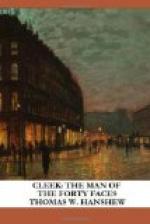Cleek threw up the sash and looked out. A huge wistaria with tendrils as thick as a man’s wrist covered the side of the house, and made a veritable ladder down to the little garden; and, firmly secured to this, on a level with the window-sill and within easy reach therefrom, was the dovecote in question. He put in his hand, and slowly drew out four stiff, cold, feathered little bodies, and laid them on the dressing-table before her; then, while she was grieving over them, he groped round in all corners of the cote and drew forth still another.
“Five?” she exclaimed in surprise. “Five? Oh, but there should be only four, Mr. Headland. It is true that George brought over all six the day before; but I ‘flew’ one to him in the early morning, and I ‘flew’ a second at night, with the message about the belt; so there should be but four.”
“Oh, well, possibly one was ‘flown’ by him to you, and it ‘homed’ without your knowledge.”
“Yes, but it couldn’t get inside the wired enclosure unassisted, Mr. Headland. See! that spring-door has to be opened when it is returned to the cote after it has carried its message home. You see, I trained them, by feeding them in here, to come into this room when they were flown back to me. They always flew directly in if the window was opened, or gave warning of their presence by fluttering about and beating against the panes if the sash was closed. And for a fifth pigeon to be inside the enclosure—I can’t understand the thing at all. Oh, Mr. Headland, do you think it is anything in the nature of a clue?”
“It may be,” he replied evasively. “Clues are funny things, Miss Morrison; you never know when you may pick one up, nor how. I shouldn’t say anything to anybody about this fifth pigeon if I were you. Let that be our secret for awhile; and if your father wants to know why I sent for you to come up here again—why, just say I have discovered that your pigeons are dead for want of food.” And for a moment or two, after she had closed the door and gone below again, he stood looking at Mr. Narkom and slowly rubbing his thumb and forefinger up and down his chin. Then, of a sudden:
“I think, Mr. Narkom, we can fairly decide, on the evidence of that fifth pigeon, that George Carboys left this room voluntarily,” returned Cleek; “that the bird brought him a message of such importance it was necessary to leave this house at once, and that, not wishing to leave it unlocked while he was absent, and not—because of the Captain’s inability to get back upstairs afterward—having anybody to whom he could appeal to get up and lock it after him, he chose to get out of this window, and to go down by means of that wistaria. I think, too, we may decide that, as he left no note to explain his absence, he expected to return before morning, and that, as he never did return, he has met with foul play. Of course, it is no use looking for footprints in the garden in support of this hypothesis, for the storm that night was a very severe one and quite sufficient to blot out all trace of them; but—Look here, Mr. Narkom, put two and two together. If a message was sent him by a carrier pigeon, where must that pigeon have come from, since it was one of Miss Morrison’s?”




